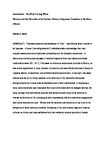Assimilation—On (Not) Turning White: Memory and the Narration of the Postwar History of Japanese Canadians in Southern Alberta
| dc.contributor.author | Aoki, Darren | |
| dc.date.accessioned | 2018-11-26T10:52:17Z | |
| dc.date.issued | 2019-12-06 | |
| dc.identifier.issn | 0021-9495 | |
| dc.identifier.issn | 1911-0251 | |
| dc.identifier.uri | http://hdl.handle.net/10026.1/12884 | |
| dc.description.abstract |
This essay explores understandings of “race” – specifically, what it means to be Japanese – of nisei (“second generation”) individuals who acknowledge their near complete assimilation structurally and normatively into the Canadian mainstream. In historically-contextualized analyses of memory fragments from oral-history interviews conducted between 2011-2017, it focusses on voices and experiences of southern Alberta, an area whose significance to local, national, continental, and trans-Pacific histories of people of Japanese descent is belied by a lack of dedicated scholarly attention. In this light, this essay reveals how the fact of being Japanese in the latter half of the twentieth century was strategically central to nisei lives as individuals and in their communities. In imagining a racial hierarchy whose apex they knew they could never share with the hakujin (whites), the racial heritage they nevertheless inherited and would bequeath could be so potent as to reverse the direction of the colonial gaze with empowering effects in individual engagements then and as remembered now. We see how the narration and validation of one’s life is the navigation of wider historical contexts, the shaping of the post-colonial legacy of Imperial cultures, as Britain and Japan withdrew from their erstwhile colonial projects in Canada. | |
| dc.format.extent | 238-269 | |
| dc.language | en | |
| dc.language.iso | en | |
| dc.publisher | University of Toronto Press | |
| dc.title | Assimilation—On (Not) Turning White: Memory and the Narration of the Postwar History of Japanese Canadians in Southern Alberta | |
| dc.type | journal-article | |
| dc.type | Review | |
| dc.type | Journal | |
| plymouth.issue | 2 | |
| plymouth.volume | 53 | |
| plymouth.publication-status | Published | |
| plymouth.journal | Journal of Canadian Studies | |
| dc.identifier.doi | 10.3138/jcs.2018-0008 | |
| plymouth.organisational-group | /Plymouth | |
| plymouth.organisational-group | /Plymouth/Faculty of Arts, Humanities and Business | |
| plymouth.organisational-group | /Plymouth/Faculty of Arts, Humanities and Business/School of Society and Culture | |
| plymouth.organisational-group | /Plymouth/REF 2021 Researchers by UoA | |
| plymouth.organisational-group | /Plymouth/REF 2021 Researchers by UoA/UoA28 History | |
| plymouth.organisational-group | /Plymouth/Users by role | |
| plymouth.organisational-group | /Plymouth/Users by role/Academics | |
| dcterms.dateAccepted | 2018-11-25 | |
| dc.rights.embargodate | 2020-12-5 | |
| dc.identifier.eissn | 1911-0251 | |
| dc.rights.embargoperiod | Not known | |
| rioxxterms.versionofrecord | 10.3138/jcs.2018-0008 | |
| rioxxterms.licenseref.uri | http://www.rioxx.net/licenses/all-rights-reserved | |
| rioxxterms.licenseref.startdate | 2019-12-06 | |
| rioxxterms.type | Journal Article/Review |


